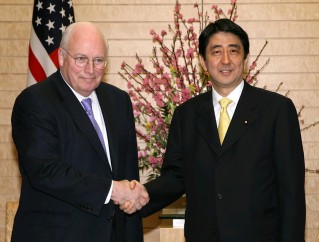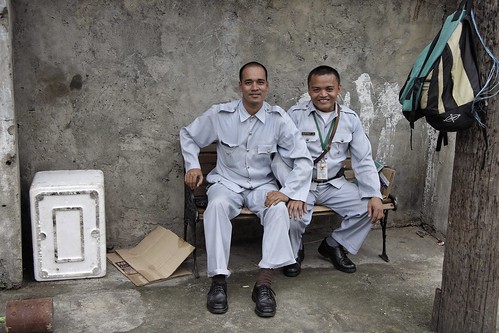Though the Japanese media has been running speculation of a cabinet reshuffle or other personnel changes in the Abe cabinet since January at least, the Daily Yomiuri has come out with one of the first English-language pieces discussing the possibility that I’ve seen from a major media outlet. According to the Yomiuri, the blame for the many mishaps that have dogged the Abe administration is falling on Chief Cabinet Secretary Yasuhisa Shiozaki, who would be “the main target for reshuffle”:
Shiozaki has been criticized for his lack of ability to coordinate the Cabinet’s crisis-management and damage-control systems. When scandals involving Cabinet ministers emerged, Shiozaki only said they should be held accountable for the alleged scandals.
A chief cabinet secretary is supposed to have the Prime Minister’s Office report all the facts to him, conduct investigations based on them, check whether the government can overcome opposition grilling in the Diet and media criticism, and decide whether to protect the cabinet ministers in question or have them resign. But things are different under the Abe Cabinet.
Partly because of lack of political experience, Shiozaki has failed to keep a tight grip on the reins of the bureaucrats in Kasumigaseki and coordinate policies with the ruling parties sufficiently. It is worrying that he is so inflexible in his thinking. Because of his inability to delegate, he inserts study meetings into holiday schedules. Thus, he has less leeway of mind than the play of a steering wheel.
The Asahi, never to be outdone, has its own English article on Shiozaki-directed criticism. I feel like this report is more balanced and attributes the criticisms to actual sources rather than editorializing within the article. It also draws different conclusions, saying that Shiozaki has become a Rumsfeldian sponge for criticism from Abe’s critics:
On Jan. 14, LDP Policy Research Council Chairman Shoichi Nakagawa berated Shiozaki in a telephone call, telling him that his habit of setting up task forces one after the other to deal with major policy issues could easily result in a storm of media criticism.
Shiozaki was clearly taken aback, according to sources.
Some lawmakers say the task force policy serves only to make some Cabinet ministers less willing to follow the party line.
For example, Shiozaki has proposed setting up task forces on strengthening cooperative relations with Asian nations, another to deal with the declining birthrate and yet another to consider how to revive economic growth.
In spite of these problems, LDP lawmakers thus far have refrained from criticizing Abe directly.
They fear that if they do so, they will be branded as trying to engineer a coup against the Cabinet.
For this reason, they are sharpening their knives against Shiozaki, whose job makes him the government’s most senior spokesman.
Shiozaki has been getting panned in the media since the Abe cabinet’s inception for being the most arrogant and domineering personality in a cabinet that’s full of them. While the Yomiuri article cites “failures” without really going into detail, it is pretty representative of the type of reactions the “hated Chief Cabinet Secretary” (as he was described in a January Bungei Shunju article) has been getting. He’s been accused of both dominating Council on Economic and Fiscal Policy meetings that are supposed to be the domain of Minister of State Hiroko Ota, taking the initiative on North Korean abduction issues, as well as crowding out Special Advisor Hiorshige Seko, who’s supposed to be in charge of PR. While the economic reform agenda may yet be the underappreciated gem of the Abe administration, it’s clear that Abe’s PR response has been just awful.
There’s a great piece detailing who did what in all the Abe blunders of the past 5 months entitled “Support Rates Plummeting, the ‘Abe Kantei’ is no Longer Functioning” that ran in the March issue of Bungei Shunju that you can read in Japanese here. I want to summarize one incident mentioned in the article over which Shiozaki was judged to have messed up playing the role of nemawashi (consensus-builder): the attempt by Abe in late November/early December to move a special account dedicated to road construction to the general account, including the national gasoline tax. Though the highway public corporations were privatized in 2005 as part of Koizumi’s plans to eliminate a major source of wasteful spending, reform of the special account was put off as too politically volatile at the time.
The idea was proposed by CEFP Minister Ota as a way to boost Abe’s falling approval ratings. Both Shiozaki and Abe approved of the policy, and Abe in particular thought that reforming a tax that’s been in place since 1954 would be a good way to showcase his policy of moving beyond the postwar era. But Shiozaki had absolutely no experience as a liaison charged with building consensus within the LDP. Abe announced that he intended to reform the special account for highways, including the gasoline tax, at a meeting of the CEFP and then left the rest to Shiozaki. But his overtures to some of his political allies hit a snag, since the gasoline tax, at 3 trillion-yen per year in collected revenues, is a major source of funding for road construction, probably the biggest source of pork-barrel spending in Japan (and therefore the basis of many politicians’ support). They suggested he try to reform an auto tax that is charged on the weight of the automobile, since there is no legal basis for the funds to be set aside for road construction. He called Seko for help, but Seko, who’s a PR expert not a well-connected politician, thought it was too late to move forward with the policy as Abe outlined it since no one would go along with a complete separation of the gas tax from the special account. A trip to the LDP’s top upper house member Mikio Aoki was similarly unsuccessful: “The upper house won’t take responsibility if it doesn’t come in a form that builds necessary roads.”
In the end, Shiozaki had to rely on Deputy Chief Cabinet Secretary Advisor Atsuo Saka, whom Abe reportedly “loathes” but can’t technically replace. Shiozaki met with Saka along with Finance Minister Koji Omi and Transportation Minister (and former Komeito President) Tetsuzo Fuyushiba. Saka, sensing an opportunity, suggested a compromise: agree to free up only 1.8 trillion yen of the gasoline tax and put off the debate on sweeping reform. Saka was more than happy to play consensus-builder, but the newspapers excoriated both Shiozaki and Abe, saying that the development was a “loss” for kantei-led politics and a blow to the reform agenda.
Now, I don’t think all the administration’s mishaps are Shiozaki’s fault — Abe’s executive secretary Inoue, Sec Gen Nakagawa, Seko, and others have all had trouble working together and made their own mistakes — but it could be that replacing him with someone less headstrong might help ease tensions.
Continue reading Shiozaki out, Takenaka in? Who’s to blame for Abe’s sputtering?




